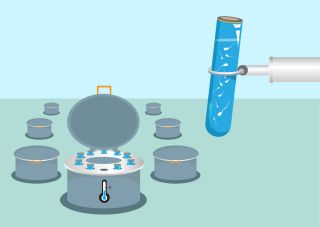Identity
The Ethical Sperm Bank: An All-Open Sperm Bank
Personal Perspective: Openness is an idea whose time has come.
Posted January 25, 2024 Reviewed by Michelle Quirk
Key points
- Prospective parents and sperm donors should be making fully informed decisions.
- Understanding the needs and rights of the children to be born is essential.
- Connecting families and donors right from pregnancy or birth is a successful working solution.

Ethics intersects with psychology and mental health as the fields involve the study and understanding of human behavior and well-being. While psychology studies human behavior, ethics is more of an exploration of how we can know the right thing to do, especially when consequential decisions and choices must be made.
The Ethics of Donor Conception
Ethical perspective: The ethics of egg, sperm, and embryo donor conception varies over time and across cultures, legal frameworks, business practices, and personal beliefs. Psychological and medical research coupled with ongoing donor-family reporting has contributed to a better understanding of the impact of donor conception on individuals, which can inform ethical guidelines for reproductive medicine industry professionals and gamete sellers.
Informed consent: It is essential for all donors and intended parents to have a comprehensive understanding of the implications, potential psychological consequences, and long-term effects of selling one's gametes or buying gametes to build a family.
Identity formation: Donor-conceived people (DCP) may experience unique challenges in their identity formation due to potentially having little or no information about half of their close biological relatives. This raises ethical questions about the rights of individuals to know their genetic heritage and the potential psychological impact of not having access to that information.
Disclosure and secrecy: The decision to disclose or withhold information about donor conception to the child has ethical implications. It involves considerations of honesty, openness, and the potential psychological consequences of nondisclosure for the child and the family. The psychological impact of discovering the truth later in life, without prior knowledge or preparation, has been shattering for thousands of DCP.
Parent-child relationships: Donor conception affects the dynamics of parent-child relationships. Ethical questions arise about the responsibilities of parents to address and support the emotional needs and curiosities of donor-conceived children, as well as the potential impact on the bond between parents and children when the truth is not disclosed early in a child's life.
Donor anonymity and identity rights: The practice of anonymous donation raises ethical concerns regarding the rights of the child to know their genetic heritage and relatives and family medical information, as well as the potential psychological consequences associated with not having access to that information. Acknowledging the end of donor anonymity can better support the psychological well-being of DCP. Reaching out to unknown relatives, who may be shocked by the connection via a DNA test, shouldn't be necessary.
Psychological support: The availability of emotional support, counseling, education, and guidance can help individuals navigate the complexities and potential psychological challenges associated with donor conception.
An Idea: The Ethical Sperm Bank
An all-open sperm bank would offer an alternative to those who want to do the right thing for their children. The sperm bank could initiate a program for facilitating early mutual consent connections, or utilize the Donor Sibling Registry (DSR), an organization that since 2000 has followed this principle as a matter of regular practice for almost 100,000 people.
This system of early contact (from pregnancy or birth) has been promoted and utilized successfully by dozens of egg and embryo clinics and agencies for many years. It’s long overdue for a sperm bank to follow suit.
The ethical sperm bank would differ from existing U.S. sperm banks in several areas:
- Contact: The issue of attempted contact, 18 years later, between the donor and the offspring is removed from the hands and focus of the sperm bank.
- Consent: With early mutual consent contact, the sperm bank would not need to be worried about protecting anyone’s privacy.
- Currentness: The sharing and updating of medical information happens without delay, as the sperm bank has provided a contact tool for direct medical updates.
- Empowerment: With adequate education and counseling, parents and donors can decide the timing, depth, and breadth of their relationships. They do not need a middleman telling them what’s best for them and their family.
Openness
Is it ethical to bring a human being into the world who is deliberately cut off from their ancestry, family medical history, and close genetic relatives for 18 years or forever? Is there any psychological entity or research from any society or culture at any time that has deemed this practice in the best interests of any group of people?
All sperm banks currently mandate a minimum of 18 years of donor anonymity, not willing to facilitate earlier contact. The ethical sperm bank would require all parents and donors to make themselves available for contact, either facilitated directly by the bank, or via the DSR, right from pregnancy or birth of the child. Parents and donors could share photos, answer questions, share information about themselves, and provide updated family medical history.
The reason behind fostering early contact is that identity formation begins long before the age of 18. Knowing who and where you come from is an important component for adolescents in constructing an identity that will be the foundation for adulthood. Over the past few decades, curiosity about donors and half-siblings has been reported by many thousands of donor-conceived children and young adults, long before they’re 18. When possible, shouldn’t everyone have the opportunity to grow up having access to their close genetic relatives?
Reporting, Recording, and Limiting Births
Is it ethical for an industry helping to create human life to have little to no accurate record keeping on the children born? Is it ethical to create half-sibling groups of more than 50, 100, or 200?
Sperm banks have never accurately tracked births, as all birth reporting is voluntary. Without such tracking, no realistic limits can be expected or promised on births per donor.
The ethical sperm bank would require birth reporting. They would conscientiously record and openly report how many children were born for any one donor. This practice would foster greater accountability and responsibility as it would enable the bank to accurately limit the number of births per donor.
Careful limiting of the number of children born to any single donor would allow for the avoidance of consanguinity and social overwhelm. Donors and donor-conceived people would be less likely to feel the stress of having or meeting a challengingly high number of relatives. If there was a genetic medical issue, the number of possible children to be affected would be more manageable.

Medical Updates
Is it ethical to deliberately keep reported medical information from being shared between donor family members? Is it ethical for gamete vendors to claim that they conduct yearly medical updates on donors when they don’t do so? Is it ethical for gamete vendors to continue selling gametes after receiving reports of genetic issues? Is it ethical for gamete vendors to continue selling the sperm of a deceased donor without disclosing that fact?
There is little medical follow-up with donors from sperm banks, and information is rarely shared and updated with families, even when known. The importance of establishing contact with a donor to ensure a free flow of updated medical information cannot be overstated. Every family and donor should have direct contact with each other to update medical information so that appropriate preventive medicine, medical screenings, and appropriate treatments can be sought.
Genetic Testing
The ethical sperm bank would carry out comprehensive genetic testing on both recipients and donors. Many existing sperm banks claim to do so, but this practice is neither thorough nor comprehensive at all facilities. Currently, some sperm banks test some donors for some diseases, apart from the U.S. Food and Drug Administration's mandated practice of sexually transmitted infection testing. For a sperm bank or donor to hide a genetic condition that may be passed down to progeny is unethical and potentially tragic.
Looking Ahead
The growing societal movement toward openness and honesty with one’s donor-conceived children, along with adequate counseling and education, will eventually result in all parents being able to make fully informed and ethical choices for their families. Donors can also be properly educated and counseled about the choices they’re making so that they would only donate if they were willing to be known right from the start. Parents can demand an end to the longstanding mandatory minimum of 18 years of donor anonymity. In the absence of government oversight and regulation in these matters, the idea of an ethical sperm bank provides many solutions to the challenging issues that donor families have grappled with for more than 80 years.
References
Rob Stein. Found on the Web, With DNA: a Boy's Father. Washington Post. November 13, 2005.




